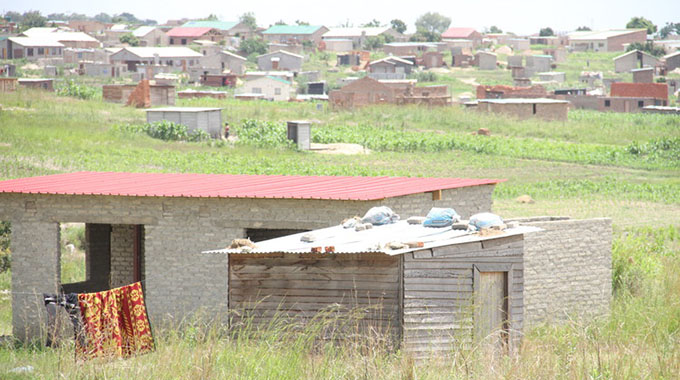Harare gets priorities right with new policy

Lovemore Chikova
Development Dialogue
Planning, developing and managing settlements is an important local governance function, which many cities and towns in Zimbabwe have been neglecting in recent years.
This has given rise to land barons, who see opportunities because of the increasing number of desperate home seekers.
The presence of land barons has resulted in settlements, especially in the capital Harare, facing many challenges with the rise of slums and the growth of unplanned settlements.
But the Harare City Council has come up with a new policy aimed at specifically stifling activities by land barons, and end the haphazard settlements characterising some areas of the city.
The proposed Human Settlements Policy, once approved, will restore the city’s control over its land bank and make it impossible for land barons to continue with their wayward behaviour.
With the city council once again in full control of land activities within its jurisdiction, formulation of the development agenda in terms of land use will ensure a new trajectory.
The new policy, which is undergoing scrutiny within council, has strict emphasis on proper procedures of settling home seekers.
Land barons are in the habit of “identifying” council land, settle people and then seek council regularisation and approval.
The city is putting a stop to all this by creating a land bank and drafting informed forward plans on built-up areas and other land-use needs.
What is important about the Human Settlements Policy is that it ensures organised settlements in the city, thereby playing an important role in the country’s broad development agenda.
Haphazard settlements are known to disrupt any country’s aspirations in terms of development, as they create slums that breed all kinds of vices and retard progress.
Land barons have been responsible for creating such slums in Harare by claiming council land, and settle people where there are no services.
In cases council wanted to demolish the unplanned settlements, it had to go through the courts to seek a court order and fulfil other long and winding processes.
Harare is one city that has been in recent years, held back in terms of its developmental agenda by the emergency of these unplanned settlements caused by land barons that led to eruption of social ills and disease outbreaks.
The proper route being proposed by the new policy is that no one will be settled on a piece of land that has no services like sewer, water supply, roads and power lines.
This alone eliminates land barons who have been only after collecting money from desperate residents without investing it into developing the residential stands.
This was worsened by that the City of Harare used to emphasise on the provision of housing for its residents, hence officials sometimes felt the need to regularise the new areas in the hope that the land barons would eventually install the required services.
Through the Human Settlements Policy, the council is taking a new turn, drawing a clear line between its desire to provide housing and creating human settlements that are fit for habitation.
The new focus on human settlements means that the city council will not approve settlements on any area that is not properly serviced.
The city is giving out a message that it is fully aware of its land bank and does not need third parties like land barons to lay claim on “discovering” the land.
Through the Human Settlements Policy, the city council is reminding land barons that their days are over, as it will only deal with authentic land developers capable of fully servicing the land before it is allocated.
The competent land developers that will partner with the city will still have to prove they are up to the task before being allowed to service any land.
The engaged developer will have to submit a detailed business proposal on a number of issues, including the size and number of stands, the beneficiaries, project funding mechanisms and expertise in developing land.
The new policy is intended to address the deteriorating housing conditions in the city and bridge the shortfall in housing stock arising from demand that by far surpasses supply.
There are, of course, many reasons for this lack of balance between supply and demand for housing in Harare.
Many people have been migrating from rural areas to urban areas in recent years, seeking opportunities in the city, following natural phenomenon ravaging rural areas.
Droughts and other natural disasters caused mainly by climate change has meant that activities like farming that usually support people in rural areas can no longer cope.
This rural to urban migration has been putting pressure in cities like Harare, where people become desperate for accommodation and end up falling prey to land barons.
In light of this, Harare’s Human Settlements Policy did not emerge from nowhere, as it considered many international and local housing development protocols.
It is anchored on the country’s Vision 2030 of achieving an upper middle income economy, and draws from the United Nations Habitat Agenda 1996.
What is also unique about this new policy is that it came out of thorough consultative processes in all wards, key informant interviews and review of academic, policy and development literature.
Under the new policy, council will adopt a priority system for all housing projects in the city, which include giving priority to an applicant who has lived and worked in Harare longer than the other applicant on the housing waiting list.
Heads of households and the size of a household will be the other consideration for priority.
A rigorous assessment and screening of an applicant’s affordability shall be carried out before the allocation of stands/houses to ensure that the beneficiary can afford the cost.
Income for the applicants in the informal sector will be carefully and fairly assessed.
The city will also consider beneficiaries of privately funded housing schemes who have the capacity to develop their own houses without financial assistance.
Before they are engaged, private developers will have to submit a detailed business case proposal, outlining the number of stands or size of the land required.
They will have to provide details of the target group expected to benefit from the project, the type of tenure to be employed by the beneficiaries, project funding mechanisms and their expertise to execute the project.
The Human Resettlements Policy entails Harare coming up with an Economic Development Plan and Programme with clear competitive sectors, which shall govern settlement design or redesign and overall governance.
The plan will be reflected in the city’s budgets, spatial and infrastructure plans.
Clear strategies will be devised regarding land acquisition, compensation and administration within the city, while processes of land planning and development for settlements will fully involve the local communities.
The city will also maintain updated databases of settled land by use category, the owners/users, regularly audit land use efficiencies and make appropriate policies that encourage efficient and equitable land markets.
Land that is objectively determined as derelict and underutilised will be acquired based on design and implementation of a robust development control system.
There is no doubt that if adopted by council and eventually implemented, the Human Settlements Policy will be a good strategy to make the housing sector attractive to both local and foreign investors.
This will contribute to the modernisation of Harare, with well-planned and clear settlement agenda that considers the residents’ human rights.







Comments